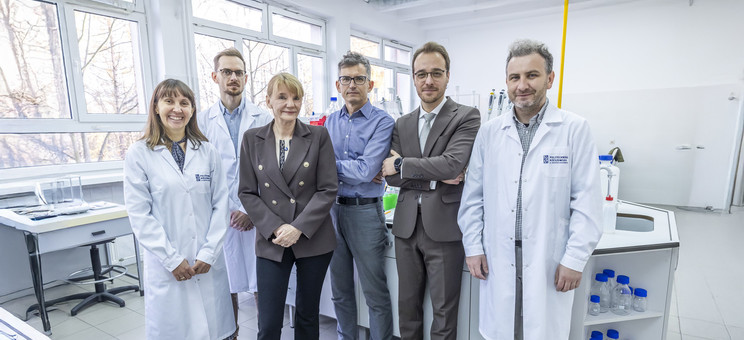Professor Dorota Antos Leads International Research Project Under NCN OPUS 26+LAP/Weave Grant Competition

The project, titled "Continuous Protein Crystallization Process," led by Professor Dorota Antos, BEng, PhD, DSc, Prof.Tit., in cooperation with researchers from Germany and Austria, aims to create an innovative method for separating and purifying recombinant proteins (essential for medical diagnostics and therapeutic applications). The method is based on crystallization, enabling sustainable, efficient production at lower costs. This approach will enhance the accessibility of these proteins in low- and middle-income countries, helping them benefit from advancements in modern medicine.
The project builds upon the extensive experience and significant scientific achievements of Professor Antos’s research team. The institutions involved include Rzeszów University of Technology, the University of Natural Resources and Life Sciences in Vienna (BOKU), and Otto von Guericke University Magdeburg (OVGU). The project will run for 36 months with total funding of 3 million EUR, of which PLN 1,802,740 has been allocated to the team at Rzeszów University of Technology.
Project Overview
Highly pure bioactive proteins are crucial for biomedical diagnostics and therapeutic applications. The growing global demand for such proteins necessitates economical and efficient production methods. Ensuring accessibility to these proteins in low- and middle-income countries is essential for equitable access to advancements in modern medicine.
The Concrys project aims to develop a novel method for the separation and purification of recombinant proteins based on crystallization. This approach will enable sustainable, efficient production at significantly lower costs compared to chromatography technology, which is currently required to meet quality standards. While chromatography processes are highly selective, they often become bottlenecks and drive up production costs due to their low efficiency and the high price of chromatography resins. In contrast, crystallization offers advantages such as lower costs, higher efficiency, and effective purification.
The research group led by Professor Dorota Antos, BEng, PhD, DSc, Prof.Tit., including Izabela Poplewska, BEng, PhD, Renata Muca, BEng, PhD, Mateusz Przywara, BEng, PhD, Roman Bochenek, BEng, PhD, Bartłomiej Filip, BEng, PhD, and Michał Kołodziej, BEng, PhD, has developed the concept of Forced Convection Crystallization (FCC) as an alternative to current crystallization techniques. In this process, optimal crystallization conditions are achieved by controlled water removal from the protein solution under mild temperature conditions. Until now, this process has only been implemented intermittently at the laboratory scale, without the potential for industrial application. Under the Concrys project, the FCC concept will be expanded into a continuous mode (CFCC). A mechanical stirrer will be replaced by an Archimedes screw, ensuring effective yet gentle mixing conditions. The potential of the CFCC process lies in its seamless integration with recombinant protein production in continuous bacterial cell cultures (CRPP).
As part of the trilateral collaboration, a new technology will be developed at the University of Natural Resources and Life Sciences in Vienna (BOKU) to enable continuous protein production using low-cost culture media. During the Concrys project, a framework for designing the CFCC process and its integration with CRPP will be established. This framework will rely on a detailed dynamic process model developed by the research team at Otto von Guericke University Magdeburg (OVGU). The model will account for critical factors influencing the process, including mass and heat transfer, hydrodynamic conditions, thermodynamics and kinetics of crystallization, and crystal size distribution.
The project will also significantly enhance understanding of the protein crystallization mechanism, which is not yet fully understood. To achieve these objectives, the project combines expertise from Rzeszów University of Technology in chemical engineering (process knowledge in protein crystallization), BOKU in bacterial expression technology, and OVGU in complex process modelling.
About the Competition
The OPUS program is the largest grant competition of the National Science Centre (NCN). Its autumn edition provides funding for projects conducted by scientists in international collaborations under the Weave program. This program simplifies the process of applying for funding for bilateral or multilateral research collaborations with scientists from Austria, the Czech Republic, Germany, Slovenia, Switzerland, Luxembourg, and Belgium (Flanders). Recent LAP projects funded under OPUS 26+LAP/Weave include bilateral collaborations with German scientists, with additional participation from Austrian and Czech researchers in trilateral projects. Applications were evaluated by expert panels of the National Science Centre under the lead agency procedure. The results were approved by Germany's Deutsche Forschungsgemeinschaft (DFG), which will fund German teams, the Czech Science Foundation for Czech teams, and the Austrian Science Fund for Austrian teams.







